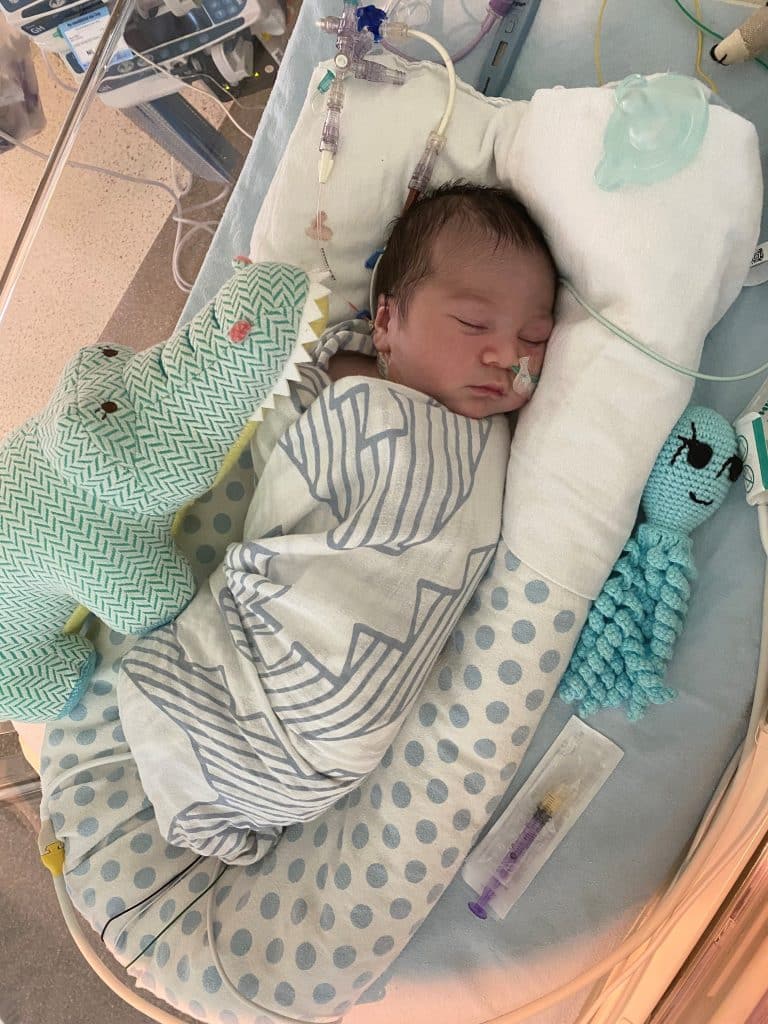The first 24 hours of Malu’s life were pretty magical for second time parents Kirra and Micheal . However, as the days progressed, their new bundle of joy seemed to be struggling with feeding. He became increasingly unwell, before eventually losing interest in breastmilk entirely. By his fifth day of life, Malu was limp, lethargic and having mini seizures.
“During Malu’s first day of life he seemed like a normal little baby and had no complications. But as time progressed, he started to become quite unwell. Later, we found out this was because he was consuming breastmilk, which contains protein – something that isovaleric acidemia (IVA) kids cannot break down,” said Kirra.
“We spent the first few days in hospital with Malu after he was born and noticed he wasn’t feeding well. However, doctors just thought he was being fussy and eventually sent us home. He was still unwell and not eating, so we took him to our local hospital. They thought he was just dehydrated, but then he started getting limp and having what seemed like mini seizures,” she added.
Concerned, doctors ordered blood tests to screen for a range of conditions. Results showed that Malu had ammonia in his blood, prompting him to be transferred via ambulance to the RCH where he underwent further genetic testing and was diagnosed with IVA, a rare metabolic condition where the body cannot breakdown certain parts of the proteins found in food.
Once he was admitted to the RCH, fast acting clinicians treated Malu with dialysis and a blood transfusion to filter his blood. He was also put on medication that will be required for his lifetime. Malu spent close to two weeks at the RCH, first on the Butterfly Ward, then the Rosella Ward, before being transferred to the Cockatoo Ward.
“Everything was so unknown when Malu was first unwell, but as soon as the doctors at the RCH knew he had the ammonia in his blood, they were all on top of it – it’s incredible how smart the doctors are and how capable the staff are. If he continued on for a couple of days, he might not be here today.”
When Malu was admitted, Kirra and Micheal, were introduced to the Wadja Aboriginal Family Place. This essential service, made possible thanks to support from The Debbie Stach Memorial Fund, The Pratt Foundation and the community through the Good Friday Appeal, provides Aboriginal and Torres Strait Islander patients and families attending the RCH culturally appropriate and equitable access to healthcare. For Kirra, this service has been a “life saver”.
“As soon as Malu was admitted to the RCH, we were introduced to the Wadja Aboriginal Family Place and given a dedicated Case Manager who helped support us during those daunting and emotional days spent in hospital with Malu,” said Kirra.

The Wadja Case Managers ensure Aboriginal and Torres Strait Islander People have equitable access to mainstream health care services. They also provide emotional, social and cultural support to Aboriginal and Torres Strait Islander children and their families who use the hospital.
“Having somebody who was also Indigenous that we could talk to when we were in a really emotional state and open up to and connect with was a godsend. I think when we connect, as Indigenous people, nine times out of 10, there’s an instant connection together and you feel super comfortable talking to that person in an open manner.
Even Malu, who didn’t warm to a lot of people as a COVID baby, warmed up to them straight away,” Kirra said.
“It was also helpful to have someone there walking us through all of the administration side of things, from parking to financial matters. They would also check in on us, and make sure we felt comfortable, despite everything that was going on. If we didn’t have support from Wadja, we wouldn’t have felt as comfortable, as we did through that time.”
Malu is now regularly seen by the Metabolic team at the RCH who manage his medications and strict low protein diet. The family’s current Case Manager, Kooma woman Netty Gaulton, continues to support and connect with Malu and his family during these visits and his admissions to hospital.
“It’s awesome knowing that Netty and Wadja share the same kind of cultural values and backgrounds and they understand how we might feel about things from a cultural perspective – it is really reassuring to feel that there’s somebody there who cares.
That’s what I love about the RCH, you get that feeling from all the staff there, but then having Wadja is the icing on the cake for us as Indigenous people,” Kirra said.
“It’s quite touching that the wider community want to put time and money into this kind of service. I think it shows that our country as a whole and our community is understanding the need for our people to support us at certain times, especially in a big environment like a massive hospital. It’s a pretty big testament towards reconciliation and closing the Indigenous health gap,” she added.
Despite his rough start to life, Malu, who celebrates his second birthday in November, is now like a regular toddler.
“Malu’s very active, he’s happy and thriving. When he was first diagnosed there was concern because he was slipping into a coma that there could be neurological damage, but we are very blessed that there wasn’t. He was walking by ten months and is hitting all his developmental milestones,” Kirra said.
“These outcomes wouldn’t have been possible without the incredible work of the RCH and the people who support it financially.”